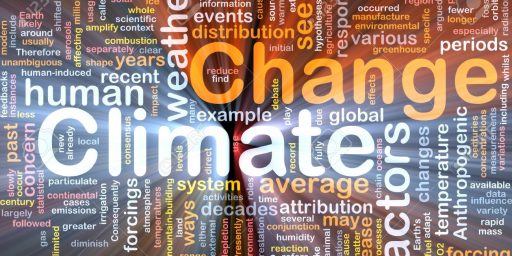Arctic Ice Cap Melting Faster Than Predicted
A study published online in the journal Geophysical Research Letters reports that the melting of ice in the Arctic Ocean is actually occurring faster than even the pessimistic predictions of the Intergovernmental Panel on Climate Change.
Climate scientists may have significantly underestimated the power of global warming from human-generated heat-trapping gases to shrink the cap of sea ice floating on the Arctic Ocean, according to a new study of polar trends.
The study, published online today in Geophysical Research Letters, concluded that an open-water Arctic in summers could be more likely in this century than had been estimated in the latest international review of climate research released in February by the United Nations Intergovernmental Panel on Climate Change.
“There are huge changes going on,” said Julienne Stroeve, a lead author of the new study and a researcher at the National Snow and Ice Data Center in Boulder, Colo. “Just with warm waters entering the Arctic, combined with warming air temperatures, this is wreaking havoc on the sea ice, really.”
[…]
Dr. Stroeve’s team found that since 1953 the area of sea ice in September has declined at an average rate of 7.8 percent per decade. Computer climate simulations of the same period had an average rate of ice loss of 2.5 percent per decade.
The finding implies that the Arctic ice may be quicker to respond to warming as concentrations of heat-trapping gases rise in coming decades, said Marika Holland, an author of the new paper and a computer modeler at the Boulder climate center.
That’s pretty disturbing news, since arctic ice in the summer actually helps keep the Earth cool by reflecting sunlight. If that ice is melting faster than predicted, that could potentially lead to accelerated increases in global temperature.
The original study is located here. Alas, it is not available for free.





Question-ish: If the majority of the U.S. was covered in ice during at least four ice ages and it retreated pre industrial age…doesn’t it lend to the idea that there is a good chance that Ma Nature runs the show and it may come back???. It may not as well. It may get real warm for awhile…or it may cool off. With a known history of heating and cooling, I can’t get my teeth into the GW hype.
This is good news to those of us that want to make Greenland green again.
Jim
markm,
Obviously, there are long term trends of peaks and valleys with respect to global temperature. Typically, we see large spikes of heat followed by a gradual cooling trend.
But, on a shorter time scale we see an abnormally large temperature spike. Sure, this could be random statistical variation, but presented with the logical scientific evidence of carbon dioxide’s influence on temperature, a reasonable person should conclude that this is not all left-wing crazy talk.
Matt T
The problem i’m having is that, foremost, i’m not a climatologist/scientist. Having said that, every time some study comes out saying “X” is happening there is another study that comes out saying it’s not out of the norm and they show their evidence. I don’t know who to believe but I do recall the same kinds of threats of us heading into a new ice age some time ago. I don’t doubt that the earth is warming (but not here in Michigan)but I am very skeptical about how much out of the norm it is and how much we are affecting it. I am also very skeptical of future trends. Climate is just not something we cannot predict yet as the inputs into the climate models are so complex. Wasn’t last year fore casted to be terrible for hurricanes???
I’m sure the SUVs are to blame.
(was that too obvious a joke to be funny?)
We are never going to get 100% consensus.
Do the two sides have an equal number of credible studies or is it more like 100-to-1 in favor of climate change being partly caused by humans?
I’m sure the planet can survive global warming.
People on the other hand…
…perhaps there are just too many of us.
Imagine you have a spring with a weight on it. At rest the system has some position of the mass representing a balance of gravity on the mass and the restoring force of the spring. Now you stretch the spring out and let it pull back. (assume no frictional forces) Now you have simple harmonic motion. The mass moves up to some high point, stops, falls back to some low point, in a symmetric cycle. The center point of this periodic movement is that same position the mass had rested at before.
With me so far? Good.
Now you go ahead and throw on another mass on the end of the spring. You still get the harmonic motion but the center point shifts downward.
Yes nature causes a certain periodic change to the temperature. But we’ve created a human additional element which is changing the mid point of the variation.
Now here’s the $64,000 question: the vast majority of life on earth developed during which of the following:
A) the natural cycle of temperature variation, OR,
B) this augmented cycle consisting of the natural plus a human element
The answer is A. Not only that but we have plenty of biological evidence of periods whenthe earth has suffered significant temp changes outside of the normal natural variation (due to huge volcanic eruptions, meteor impacts, etc.). The usual result is the dying off of 80-90% of all life on the planet.
Our intelligence makes us resillient, but not that resillient.
The link below is to a post on how instructions to to get to Greenland from Iceland changed over the period from 900 CE to 1200 CE. We are going back, hopefully,to conditions like when Greenland was settled.
Guest Post Colorado Climate Center
T
I fully understand your example but climate is NOT simple harmonics. Yes the planet warms and cools but there are far more variables, variables which we cannot predict.
And as far as venturing outside of the natural temp cycle, how far is too far?. Is the supposed 1.4 degree increase we’ve caused enough to cause 80-90% of the planet dying off??, no obviously. So we have polluted the atmosphere something terrible for 100 yrs and only have 1.4 degrees to show for it. Is 2.7 degrees enough to upset the apple cart??. I don’t know and I don’t think we can yet predict it.
True, the example is a vast simplification to make the problem more accessable.
I think you are making a common mistake here. When they talk about a 1 degree change they don’t mean the whole world gets warmer by 1 degree.
Rather there is a 1 degree change in the mean temperature. That’s huge despite how it sounds. Some areas of the planet will suffer practically no change. Others will be strongly affected.
Here’s a critical point- I tend to agree that we can’t be sure of the models. That’s why I would not support any plan that purports to correct for the expected change (examples include such fanciful schemes as changing the arctic ice albedo or deploying giant sun shades in space.
Rather what I do support is trying to minimize our contribution or impact on the natural system that sustains us. We can’t reduce it to zero but we can very easily reduce it by orders of magnitude with a simple shift in social behavior.
LJD at May 2, 2007 11:34 Permalink
“I’m sure the planet can survive global warming.
People on the other hand…
…perhaps there are just too many of us. ”
Oh, the human race can survive a lot; probably including a full-scale thermonuclear war. That’s not to say that we’d enjoy it.
Do the two sides have an equal number of credible studies or is it more like 100-to-1 in favor of climate change being partly caused by humans?
Having worked inside the dirty underbelly of a research university, I would like to state that that statement is not supportable by facts, but rather begs the question. Researchers expend a considerable amount of time wirting grant proposals and almost always tailor their results to coincide with the views of donor institutions. Not that the research in of itself is poorly done; in fact, it’s usually quite good. However, studies or results that do not support your “conclusion” are ignored or de-emphasized. Otherwise, the possibility of receiving the grant money is greatly reduced.
There was a case in the late 1980s or early 1990s in which a doctoral student found that her professor was, essentially, fudging his reported research numbers so as to gild the lily in his grant applications. I don’t remember what punishment, if any, the professor received. What I do remember is that the former graduate student was blackballed and found it quite difficult to finish her degree program anywhere. You’d think that honesty in research would be rewarded, but that’s not always the case.
Again, let me reiterate that most researchers are quite honest in their methods, but you’d have to be extremely naive to think that their results aren’t guided by the views of whom they’re asking money from.
1.4 degrees doesn’t sound like much, but lets think about that for a minute.
At 0 degrees C, water is solid while at 1.4 degrees, it is liquid. So an area of glacial ice that was once below the freezing point, is now above the freezing point, so it’s melting. Now consider the perimeter length of arctic and antarctic ice, and even if the freezing point is moved back one mile, you’re talking about thousands of square miles of ice now above the freezing point.
Now lets consider the effects of this ice melting. As Alex pointed out, ice reflects energy from the sun, while water absorbs it. Less ice means the earth is capturing more solar energy, causing it to heat more. In addition, the added water will flood low-lying areas, causing more surface water subject to evaporation, and water vapor in the air also traps solar energy, so that adds more heat to the earth. And what does that extra heat do? That’s right, it melts more ice and the cycle starts again.
It’s called a positive feedback loop, like interest on a loan, the longer you let it run the further in debt you become. A 1.4% interest rate may not sound like much, but over a period of a hundred years, even a small initial loan will balloon out of control.
The people supporting AGW come from a large variety of sources and get their money from an even larger variety of sources. Meanwhile the anti-AGW crowd almost universally get’s their money from Exxon (through a number of front organizations).
So while you have a point you are wrong in how it is applied. The side that has the vast majority of support is also the side with the diversity of interests backing it. The side that consists of a very small minority are also, and not coincidentally, all paid by someone who has a vested interest.
Stupid “heat trapped gases” guy. Dumb, dumb, and dumber. Mars is melting. What SUV produced those “heat trapped gases”?
You really don’t understand how these things work, do you?
The way things works is the sun is hot, it sends it’s waves our way and we get warmer, or we get hotter. More sun, more hotter for us. That how works.
By the way, CO2 is a mickey mouse greenhouse gas.
O. K., so I am dumb too. Dumb heat trapped gases should have read “stupid heat trapping gases”.
Are there no worthwhile research projects out there? I have one. Show that the earth’s ocean currents have ever repeated exactly.
me:
You:
A simple “no” would have sufficed. The fact of the matter is, if the sun were the only thing effecting earth’s temperature, it could not be as hot as it is. Look at Venus for an example, it gets less direct heat from the sun than Mercury, but it is actually far hotter.
Sure, but it’s the biggest one that we have any means to control. The only way we can control the amount of water vapor is to keep the global temperature down and keep ice frozen, and the best way we can do that is again to limit the addition of CO2.
No. Mercury and Venus are too screwy to use a any gage.
The great danger with treating CO2 as if it really was a strong greenhouse gas is that we bankrupt ourselves while we discover the threat never was real.
Um, no. You can’t just disregard any situation that doesn’t fit the requirements of your theory. That’s bad science.
The threat is real, nobody is arguing that the threat isn’t real, they’re arguing over whether or not humans have any effect on the threat. I also don’t see how capping emissions is going to bankrupt us.
The earth was at it’s closest point to the sun on January 3rd of this year, and will be furthest from the sun on July 7th. The difference is about 3,106,405 miles. Contrary to what you claim, the earth is on average 2.3 degrees hotter in January than it is in July, even with 7% less sunlight reaching us.
Come on, Mike, using Mercury (without any atmosphere), and Venus – where the axis of rotation lies in the ecliptic plane – and also has atmosphere squared, for models, is not smart; it is not science.
If you don’t see how capping emissions has any threat included you don’t understand human nature.
Mars has no atmosphere either, yet here it is being used as an example. And Venus’s extreme temperature has nothing to do with it’s axis of rotation, it’s almost entirely because of the runaway greenhouse effect caused by its dense atmosphere of, wait for it, CO2!
Mike, I fear for America if you are an example of our college crop. Even a mickey mouse greenhouse gas like CO2 becomes Jumbo when increased by a factor of 200,000 times. That’s right, Mike, the concentration of CO2 is 200,000 time stronger on Venus than on Earth. Science itself quavers.
Right, you don’t get the point of models, do you?
200,000 times earth’s atmosphere might sound awe-inspiring to you, even intimidating, but on the scales used in astronomy it’s minuscule. In particular, when talking about gaseous CO2’s absorption and radiation spectrum, it doesn’t matter what the pressure is. That makes Venus a perfect model for CO2 caused global warming, which we can scale down to make predictions based on earth’s CO2 levels.